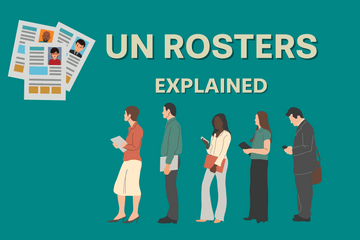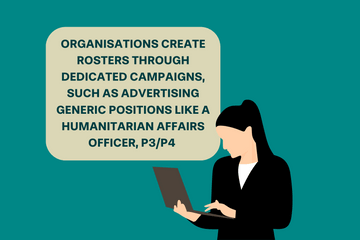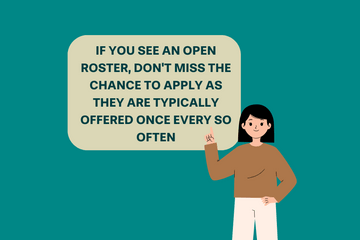Why you should be on UN rosters
If you aspire to work with the UN, being on a UN roster is an essential step towards achieving your goal. But wait – what exactly are rosters, and what types are available?

Being on a UN roster (sometimes referred to as pools) is a way to show your willingness to serve the global community and make a tangible difference in people's lives. It is an opportunity to gain valuable experience working in challenging and dynamic environments and to develop new skills and perspectives. It can open doors to a variety of career opportunities within the United Nations system, as well as in related fields such as international development and diplomacy. In the following article, we explore the types of UN rosters, how to get on one and the benefits they bring.
Rosters are the primary resource for owner agencies when recruiting staff, highlighting the significance of being part of a strong pool. Though a position may not immediately arise, it still means that exceptional candidates have the advantage of being considered from the existing pool rather than being left out.
What are UN Rosters?
In essence, a UN roster is a pool of pre-vetted qualified professionals available for short-term, medium-term, or long-term assignments with the UN. These lists are maintained by UN entities and are used to fill vacancies in various fields, ranging from peacekeeping and humanitarian assistance to legal and administrative support. Being on a UN roster means that you're considered a potential and pre-vetted candidate for these assignments and can be called upon when the UN needs your expertise without having to advertise the post. You can be handpicked directly from the roster by any hiring manager.
Rosters/Pools are created to have a pool of pre-vetted candidates from which the UN can draw to fill specific positions without having to advertise the post each time – this saves time. If a roster is advertising for new applicants in your area of expertise, it is well worth investing the time to prepare and submit your application, even if you’re on vacation relaxing at the beach. The organisation may only advertise a roster once a year, sometimes only every few years, when the talent pool needs refilling.
Types of UN Rosters
There are several types of UN rosters, each aimed at specific areas of expertise. These include the Staff Roster, the Consultant Roster, the Retiree Roster or the Standby Team Roster.
When an organisation opens a roster to recruit for a single position, such as a Humanitarian Affairs Officer, P3-P4, this is a typical Staff Roster position. Multiple talents are assessed to identify suitable candidates for this roster. Once a candidate successfully completes the recruitment process and is selected for a roster, they become part of a pool of pre-screened and qualified individuals. Being included on the roster does not guarantee immediate employment, but it does increase the chances of being considered for future employment opportunities within the UN system.
The Consultant Roster is designed for professionals with a specific area of expertise interested in short-term assignments with the UN. This roster is often used for specific projects requiring specialised knowledge and skills.
The Retiree Roster is for retired professionals interested in continuing to work in international development. They are often hired for short-term assignments and are expected to bring their extensive experience to the table.
The Standby Team Roster is for professionals willing to be on standby for emergency assignments. These individuals are expected to be available at short notice for rapid deployment to crisis zones.

How to get on a UN Roster
If you are looking to join a UN roster, the first step is to check the eligibility criteria for the roster of interest. Each roster has its own specific requirements, such as minimum education and work experience, as well as language proficiency. Once you have determined you meet the requirements, you can apply to be added to the roster. The application process may vary depending on the roster but typically involves submitting a resume or CV, completing an online application form, and undergoing a review process. Once on the roster, you’re eligible to be called upon for short-term or long-term assignments in various locations around the world. This could involve anything from emergency response work to advocacy and research. Although being on a roster does not guarantee employment with the UN, it increases your chances of being considered for assignments that match your skills and expertise.
Benefits of being on a UN roster
- Increased visibility: Being on a UN roster increases your visibility to UN agencies and other organisations that work with the UN. You have a higher chance of being considered for potential assignments and opportunities.
- Pre-vetting: UN rosters pre-vet candidates, meaning you have already been screened for qualifications and experience. This can save time in the application process, increasing the possibility of being selected for assignments.
- Access to assignments: Being on a UN roster gives you access to potential assignments that may not be advertised to the public. UN agencies often turn to their roster of pre-vetted candidates when they need to fill a position quickly or require a specific skill set.
- Professional development: UN assignments offer unique opportunities for professional development and learning. Through working in different roles and locations, you gain new skills and knowledge, broaden your network, and enhance your CV.
- Contributing to a greater cause: Working with the UN provides an opportunity to positively impact the world. You can be part of a larger movement towards global progress by contributing to the UN's mission of promoting peace, human rights, and sustainable development.
Challenges of being on a UN Roster
While being on a UN roster has many benefits, there are also some potential downsides to consider.
- Being on a roster does not guarantee employment with the UN, and even if you are selected for an assignment, it may not align with your desired location or scope of work.
- Assignments can be unpredictable and require flexibility, as they may be cancelled or postponed at short notice.
- Being on standby for emergency assignments can be emotionally taxing, as it can involve working in dangerous or unstable environments.
- The application process for UN rosters can be highly competitive, and even if you meet the eligibility criteria, you may not be selected due to the large pool of qualified candidates.
- With certain rosters, you are obliged to accept positions offered to you. i.e. if you decline more than a certain number of times, you will not be considered for future positions.
- UN rosters tend to have strict eligibility criteria, including education and work experience requirements, which can limit opportunities for some individuals.
- Despite these challenges, being on a UN roster can still be a personally rewarding and valuable experience.

In summary, UN rosters are an excellent way to get involved in international cooperation and work with the UN. Whether you're interested in short-term assignments, emergency response work, or long-term development projects, there's a roster that's right for you. By building your skills and experience, networking with UN professionals, and applying for relevant opportunities, you can increase your chances of being selected for a roster. And once you're on one, you'll have access to a world of exciting job opportunities, meaningful projects, and professional development.



